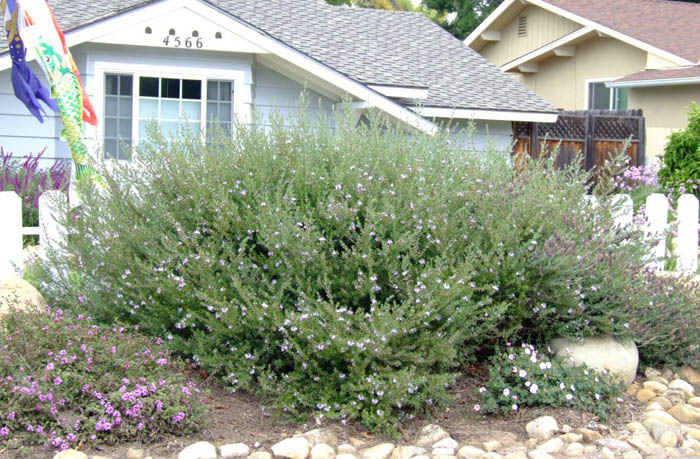Westringia fruticosa
Australian Rosemary, Coast Rosemary

Description
The Australian Rosemary is an evergreen shrub that grows 4'-6' tall. It has soft, gray green leaves and white flowers throughout the year and prefers sun and little to average amounts of water. This shrub is also drought tolerant.
Maintenance Tips
Westringia fruticosa is a fine-textured, evergreen shrub that grows 4-6' tall and 6-10' wide. Its common name is Coast Rosemary because the foliage resembles Rosemary. This plant will look and perform its best if it is given the space to reach its full mature size. The flowers bloom along the branches throughout the year in warmer climates so there is no need for deadheading. This shrub has a free-form growth habit so the thinning method is usually the best way to prune. Making pruning cuts towards the center will allow sunlight into the interior and will allow the plant to keep its free-form shape. If this shrub is being used as a formal hedge, it can be sheered to manage its shape and size without losing the blooming potential. It is a very tough plant, rarely suffering from pests or disease, and it can tolerate wind and sea spray.
Plant Type
Shrub
Height Range
3-6'
Flower Color
Lavender, White
Flower Season
Winter, Spring, Summer, Fall, Intermittent
Leaf Color
Grey Green
Bark Color
n/a
Fruit Color
n/a
Fruit Season
n/a
Sun
Full, Half
Water
Very Low
Growth Rate
Moderate
Soil Type
Sandy, Clay, Loam, Rocky, Unparticular
Soil Condition
Well-drained
Soil pH
Neutral
Adverse Factors
n/a
Design Styles
English Cottage, Formal, Japanese, Mediterranean, Ranch, Seascape, Spanish
Accenting Features
Showy Flowers
Seasonal Interest
Winter, Spring, Summer, Fall
Location Uses
Background, Shrub Border, Foundation, Parking Strip, Park, Parking Lot, Raised Planter, Swimming Pool
Special Uses
Filler, Hedge, Screen, Topiary, Mass Planting
Attracts Wildlife
n/a
Water Saving Tip:
Weather changes - so should your watering schedule. Be sure to make seasonal watering adjustments at a minimum.